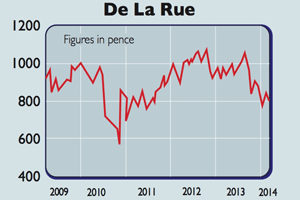Gamble of the week: Money printer falls on tough times
Investors have turned their backs on this money printer, says Phil Oakley. The shares look better value now.
Get the latest financial news, insights and expert analysis from our award-winning MoneyWeek team, to help you understand what really matters when it comes to your finances.
You are now subscribed
Your newsletter sign-up was successful
Want to add more newsletters?

Twice daily
MoneyWeek
Get the latest financial news, insights and expert analysis from our award-winning MoneyWeek team, to help you understand what really matters when it comes to your finances.

Four times a week
Look After My Bills
Sign up to our free money-saving newsletter, filled with the latest news and expert advice to help you find the best tips and deals for managing your bills. Start saving today!
It has been 18 months since we last looked at shares in this money printer. Back in September 2012, they cost 1,050p each and looked expensive on over 18 times forecast earnings too punchy for us.
The company was battling against too much capacity in the paper banknote market, which had squeezed its selling prices. Shareholders were to be kept happy with a big cost-cutting plan that was expected to take trading profits from £60m to £100m in just over two years.
A lot has happened since then. The firm will fail to hit its £100m target it will be nearer to £90m instead after issuing two profit warnings.
MoneyWeek
Subscribe to MoneyWeek today and get your first six magazine issues absolutely FREE

Sign up to Money Morning
Don't miss the latest investment and personal finances news, market analysis, plus money-saving tips with our free twice-daily newsletter
Don't miss the latest investment and personal finances news, market analysis, plus money-saving tips with our free twice-daily newsletter
On top of that, the chief executive decided to jump ship. CEOs have developed a canny knack in recent years of getting out when there's nothing more to gain. Investors are right to be cynical. So it's no surprise thatDe La Rue's (LSE: DLAR)shares have fallen back.
However, although times are tough for the company, it is still the world leader in printing bank notes and has good potential for profiting from the introduction of plastic ones. It could also go on to create a decent business with passports, although this is taking some time to develop.

In 2010, French firm OberthurTechnologies failed with a 905p pershare bid for De La Rue. While no-one iscurrently predicting that it'll return soonfor another go, when industries havetoo much capacity one of the ways ofdealing with it is through mergers andcost cutting. This can help prices andprofits for those companies that remain.
Verdict: a speculative buy
Get the latest financial news, insights and expert analysis from our award-winning MoneyWeek team, to help you understand what really matters when it comes to your finances.
Phil spent 13 years as an investment analyst for both stockbroking and fund management companies.
-
 Average UK house price reaches £300,000 for first time, Halifax says
Average UK house price reaches £300,000 for first time, Halifax saysWhile the average house price has topped £300k, regional disparities still remain, Halifax finds.
-
 Barings Emerging Europe trust bounces back from Russia woes
Barings Emerging Europe trust bounces back from Russia woesBarings Emerging Europe trust has added the Middle East and Africa to its mandate, delivering a strong recovery, says Max King